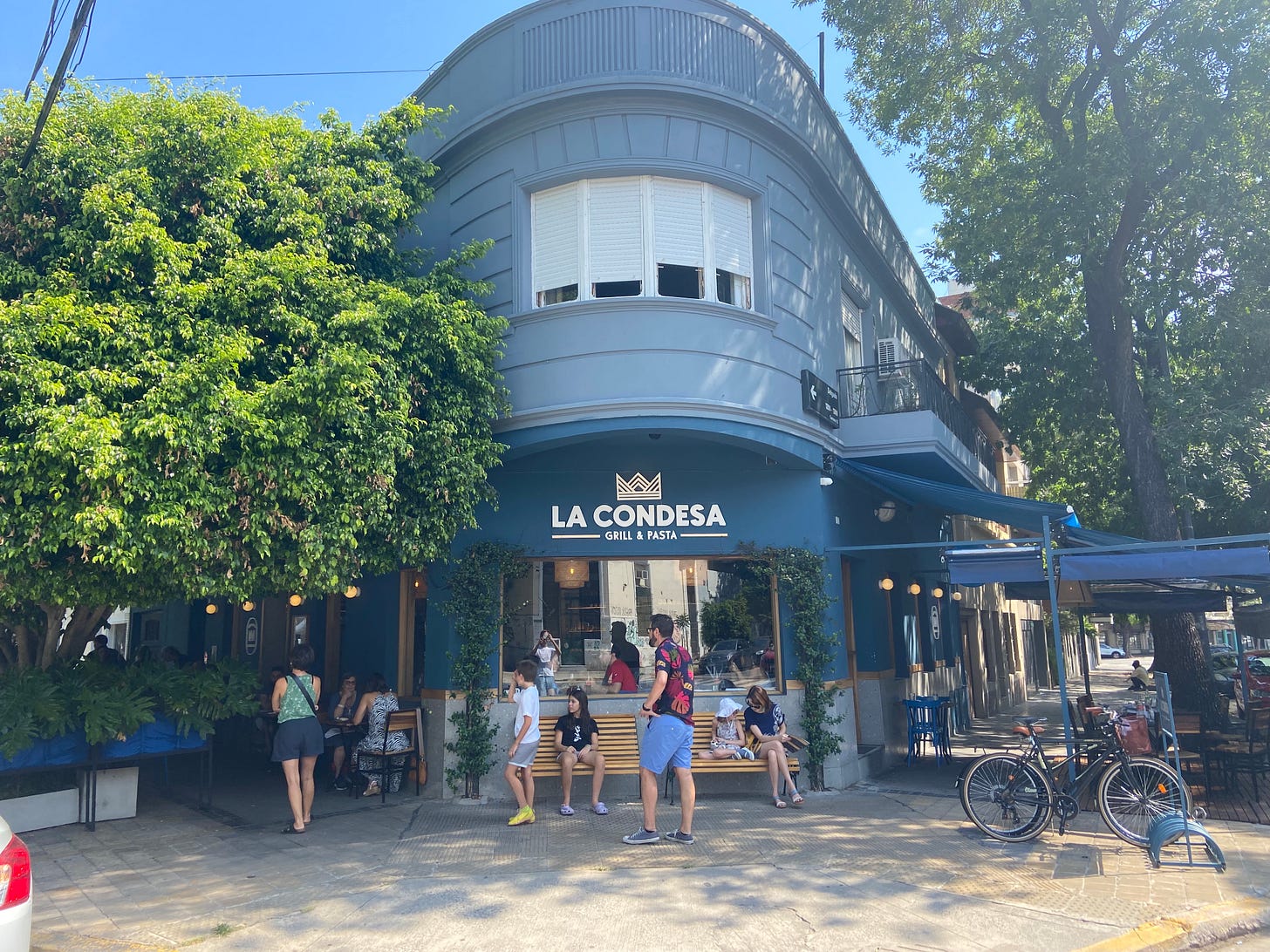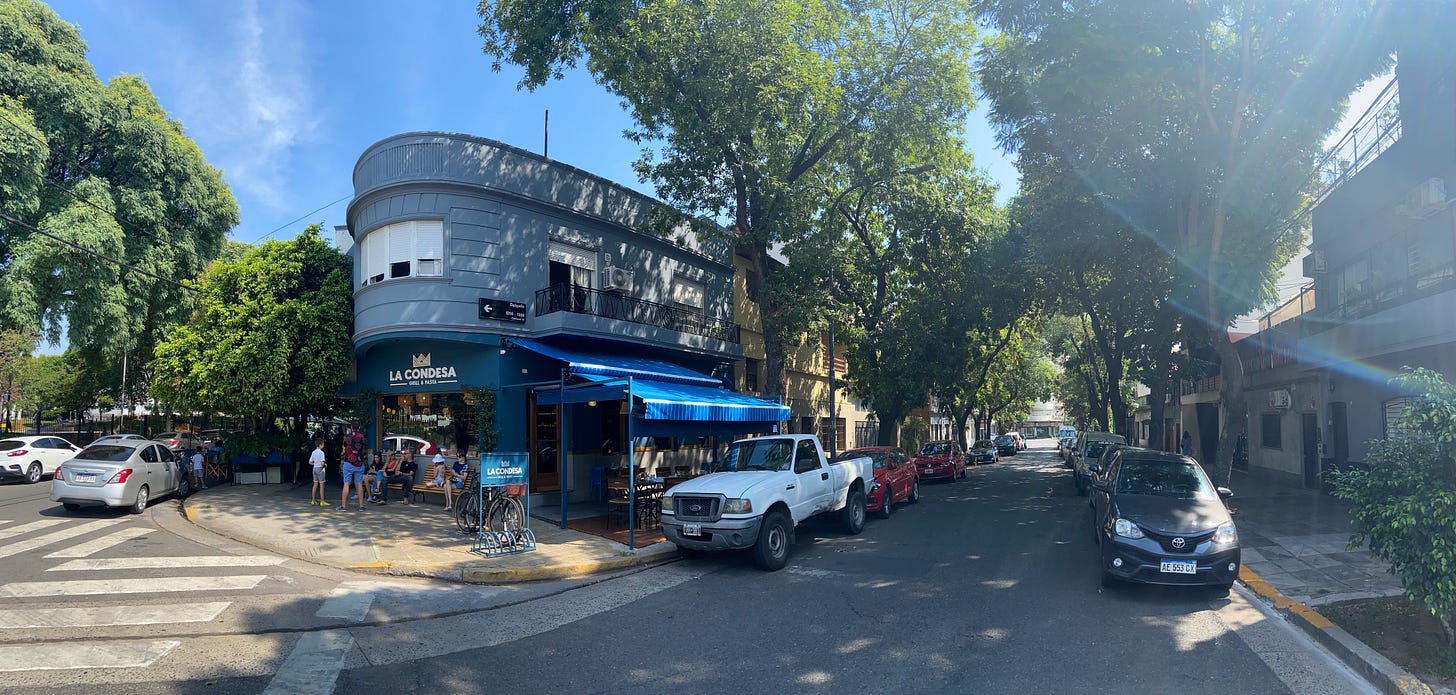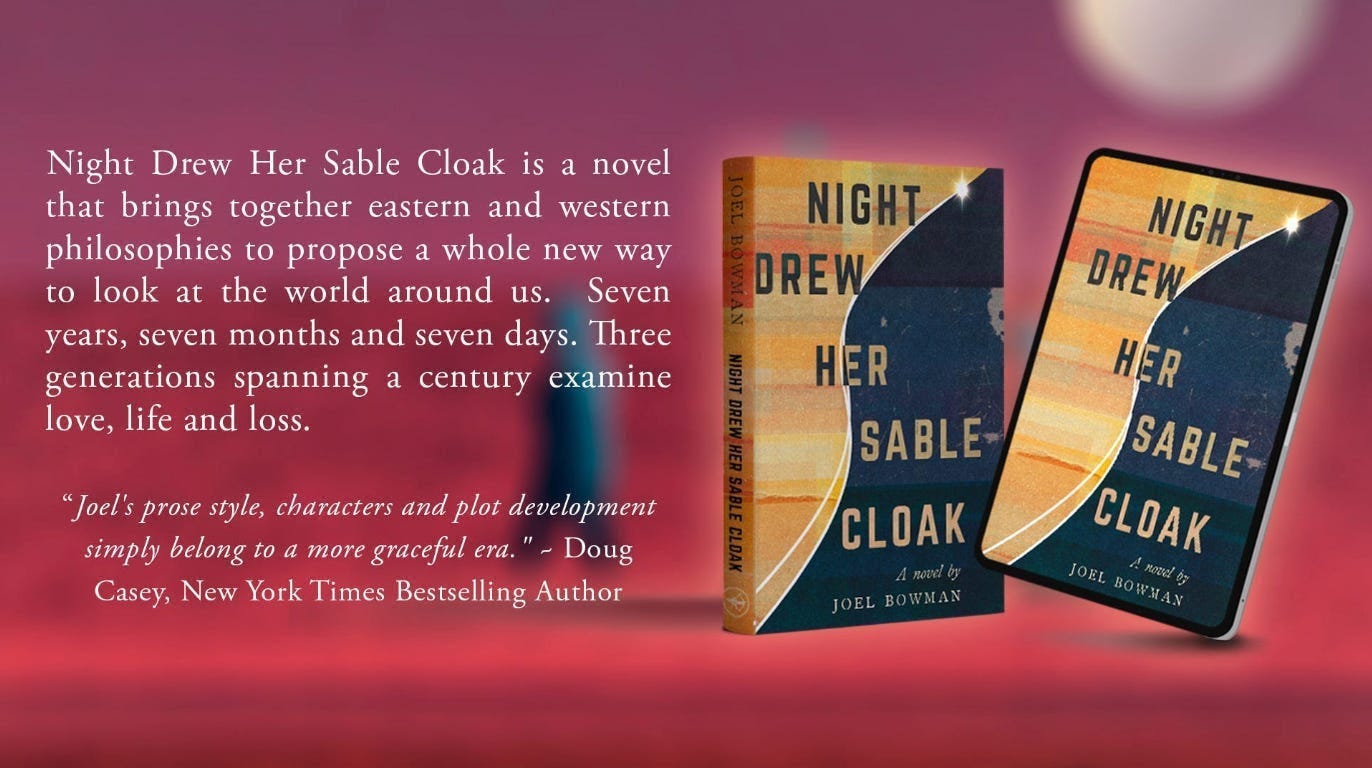
It is the insertion of man with his limited life span that transforms the continuously flowing stream of sheer change ... into time as we know it.
~ Hannah Arendt, The Life of the Mind
Time is the substance I am made of. Time is a river which sweeps me along, but I am the river; it is a tiger which destroys me, but I am the tiger; it is a fire which consumes me, but I am the fire.
~ Jorge Luis Borges, A New Refutation of Time
God is a circle whose center is everywhere, and its circumference nowhere.
~ Empedocles, Fragments
Joel Bowman, with today’s Note From the End of the World: Buenos Aires, Argentina…
Home again, home again…
What a thrill it is to return to the Paris of the South, this inspired city which gifted the world Borges, the tango, the “matrimonio Argentino” (the perfect pair of chorizo sausage and morcilla blood sausage)…
Amidst all our political pontificating of late, dear readers may have forgotten that your peripatetic author also moonlights as a hopeless romantic. Our chosen medium: the lost art of literary fiction.
Already we have a pair of pre-award winning novels to our name. And now that we are cheerfully ensconced in this belletristic metropolis, we hope to soon return to our third.
This in mind, we bring you today a columna clásica, a meandering vignette from our little neighborhood, into which we cunningly smuggle an excerpt from the foreward to our second novel, Night Drew Her Sable Cloak. Please enjoy…
[Nota Bene: Notes members can access digital copies of both our novels, Morris, Alive AND Night Drew Her Sable Cloak in the Books tab on our Substack page.
For those “old school” readers who prefer physical copies, we’ll gladly (and gratefully!) send a “perfect pair” of our novels to your address, printed on demand. Choose your membership level and support independent authorship here:
A World by Word
In a world without time, we gather at a corner parrilla in the leafy Belgrano barrio, right across from the plaza. We are seven, our little group, including the children, no younger than us. Overhead, the sun shines eternal, threading the umbrageous jacarandas to land on the cobblestones in hazy, mottled splotches. Whiffs of fatty sausages and fried potato linger on the cool breeze. It is fall, as always.
The waitress, a wiry-framed woman with skin like Tuscan grapes, arrives with dos pingüinos – ceramic penguin pitchers filled with cheap, sloshing malbec. She smiles as she listens to our preferences, writing nothing down. An open window frames her honeyed hair, long and unkempt, in blue and peeling paint. She waves to a cyclist, blushing as he passes.
Our unhurried lunch is the same as always; salchicha and blood sausage for starters, with chilled vermouth and siphon soda, then ribeye and strip steak to share, bien jugoso, accompanied by arugula greens with shaved parmesan and sun-dried tomatoes and, of course, those perennially purging pingüinos. The basket of papas fritas, glistening with oil and garlic a la provençal, passes from hand to happy hand.
Between the laughter and the tears, I think of a preface I am writing for my latest novel. Far from the corner parrilla, down the cobblestone streets, past the tired shopfronts, in a circle whose center is everywhere, I begin to order my ideas, to compose the lines, word by word...
From the Foreward to Night Drew Her Sable Cloak…
All literature is, finally, autobiographical. So observed the incomparable giant of twentieth century letters, Jorge Luis Borges. Dear readers will kindly forgive our presumption in offering an addendum to Sr. Borges’s after all truthful words: All autobiography is, finally, fictional.
Owing to the poverty of pure recollection, that conniving membrane through which all memory escapes its historical setting, wherein it is pick-pocketed, molested, exaggerated and distorted to Procrustean proportions, the past appears to us as an impression of an impression (of an impression, ad infinitum), a reflection in a hall of mirrors, a vaguely familiar juncture, buried deep in a Borgesian labyrinth. Vainly do we grasp at an image, a smell, a sensation. And as our fist clenches the sweet seawater of youth, freely does it flow from our palms, into time’s limitless ocean, eternally one with past, present and future.
Inspired by his famous “madeleine moment,” the mighty Marcel Proust spent thirteen years “in search of lost time,” reanimating the events of a life over a million and a half words spanning seven weighty volumes. And yet, from the finest grain of Balbec sand to the coquettish glint in Odette’s eye to the texture of the letter sent from Albertine’s aunt, even the penetrating exactitude of the author’s pen can but hope to emulate those now timeless moments. (To say nothing of the impressions on impressions wrought by subsequent translators, skilled though they undoubtedly were.)
All autobiography is, finally, fictional.
And yet, we do not create from nothing, but rather remake the world around us. We do not invent, only rearrange. We do not ourselves cease to be, only yield to the constant, universal change around us. This phenomenon the ancients knew well. “Nothing comes from nothing,” declared Empedocles. “The totality of things was always such as it is now, and always will be,” stated Epicurus. “Change is the only constant,” observed Heraclitus.
Modern physicists, too, have agreed on as much, formulated as the principle of mass conservation. But what say our metaphysicians? What of the world behind the world, that mysterious governing realm of universal laws, concepts and murky abstractions? When we summon the past, or fragments thereof, conscripting soldierly facts for our stories, our wild tales and world building fantasies, are we not merely shuffling memories from one place to another, rearranging experiences, plumbing perpetual permutations, filtering them through our imperfect minds, rusty from disuse and dark as a dead end in Minos’s bewildering maze?
Whether by sleights of commission or omission, all attempts at faithful recollection are mere simulacrums of a discrete moment in time, unique and unrepeatable, a transmogrification unrecognizable to the denizens of that other realm, no less abstruse to them as our own future is to us...

Measured Time
Over sweet, sticky flan and steaming cortados, coffee “cut” with milk, there is talk of fire and rivers and tigers. The sun falls on naked forearms, sleeves rolled leisurely to the elbow. In the nearby plaza, a cunning diabolist takes his makeshift stage, thrilling spectators with clockwork rabbits and hoops without circumferences and ropes without end. The adults laugh the loudest.
Emerging from the fading embers, hands darkened with coal and grease, face flushed with fire and Fernet, the asador takes in the fall sun from the stoop. The open door frames his bald head, shimmering with beaded sweat. He waves to a cyclist, doffing an imaginary cap as she passes.
From across the table, I behold my wife, essential, constant, vital. Once again, the Argentine’s words flood my mind. “Being with you and not being with you is the only way I have to measure time.”
Me too, I think. Me too.
A Diós.
Joel Bowman
P.S. Special thanks to our dear Notes members for your ongoing support. If you’d like to join our growing community and gain access to both our novels… plus all upcoming efforts with the quill…please feel free to choose a membership that suits you, below.
Members can download digital copies to their favorite e-readers immediately; Founding Members get physical copies shipped directly.





You bring life from language, Joel. You open a new world to me through your poetic prose. Muchas gracias.
Welcome back Joel. Always enjoy your travel tales. Your children are blessed to have the education you and wifey are providing. Look forward to all your new written thoughts.